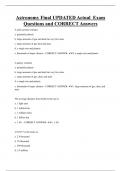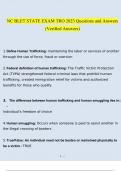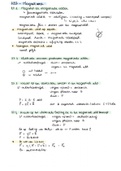NR508 Week 4-Midterm
Roles and Responsibilities of APRN - correct answer 1. All states have title protection for NP
2. All but 5 states stat's board of nursing control practice and licensure.
3. Scope of practice determined by individual NP license of licensing jurisdiction.New
prescribers must know the rules
4. in 17 states, NPs have independent scope of practice and prescriptive authority.
5.6 states have full autonomous practice and prescriptive authority.
Clinical Judgement in prescribing - correct answer 1. Best therapy
2. Least expensive
3. Least likely to cause ADR
4. Clear indication for drug?
5. Are drugs effective in treating disorder?
6. What is goal of therapy?
7. Under what conditions is it determined that drug is not meeting goal and change should be
made?
8. Unnecessary duplications?
9. OTC be just as useful?
10. Cost?
Collaboration with other prescribers - correct answer 1. Physician: can offer insight
2. Pharmacists: pharm knowledge
3. Other APRNs: clinical experience shared and collaboration
4. PAs
5. RNs.
Autonomy and prescriptive authority - correct answer 1. More states are broadening and
expanding legal, reimbursement, and prescriptive authority.
2. Gains can be reversed, so address concerns.
3. Some push for physician control.
Alpha2Agonists: MOA - correct answer 1. Activation of central alpha 2 receptors results in
inhibition of cardioacceleration and vasoconstriction centers in brain.
,NR508 Week 4-Midterm
2. Lead to decrease in peripheral outflow of norepinephrine which leads to decrease in:
a. peripheral resistance
b. renal vascular resistance
c. heart rate
d. blood pressure
3. Decrease in BP is due to sympathetic function therefore sodium retention and increased
blood volume may occur: give with diuretic.
4. Second or third line HTN drug treatment.
Alpha2Agonists: Drugs in class - correct answer 1. Clonidine
2. guanabenz
3. guanfacine
4. methyldopa.
Alpha2Agonists: Clonidine, off-label use - correct answer Tx of withdrawal d/t ability to lower
adrenergic stimulation associated with withdrawal.
Alpha2Agonists: ADRs - correct answer Oral and transdermal doses:
bradycardia, AV block, palpitations, tachycardia, hallucinations, sleep disorders, contact
dermatitis, dry mouth, orthostatic hypotension, constipation, nausea, urinary retention,
decreased sexual activity, weight gain, leg gramps, and thrombocytopenia.
MOST COMMON: dry mouth
Alpha2Agonists: Discontinue instructions - correct answer Do not stop abruptly d/t lack of
alpha 2 receptors impair homeostatic balance that regulates SNS:
Gradual taper over 4 days.
Alpha2Agonists: Guanabenz and guanfacine - correct answer 1. Used to treat HTN.
2. EXR guanfacine: ADHD
Alpha2Agonists: Methyldopa - correct answer 1. Parallels synthesis of norepinephrine (NE)
2. Stimulation by this metabolite: decrease in sympathetic outflow to the heart, kidneys, and
blood vessels.
3. End result: decreased in BP, peripheral resistance, HR, sl. decrease in CO. Produces renal
vascular resistance.
, NR508 Week 4-Midterm
4. Positive coombs test
5. Rarely hemolytic anemia.
Beta-adrenergic antagonists: affects on body systems - correct answer 1. Heart: Highest # of
receptors are in heart: decreased HR in rapid rhythms, angina, BP, reflex orthostatic
tachycardia.
2. Renal: Receptors in juxtaglomerular apparatus of kidney reduces release of renin. Decrease
in BP.
3. Respiratory: Receptors interfere with endogenous adrenergic bronchodilator activity
therefore increase airway restriction which is problem in pt with reactive airway diseases like
asthma.
4. Ocular: Decrease intraocular pressure.
5. Metabolic and endocrine: Inhibit lipolysis resulting in increased TG and Cholesterol and
decreased HDL. Also increased glucose production and inhibits insulin secretion.
Beta-adrenergic antagonists: ADRs - correct answer Usually mild and transient and rarely
require d/c of drug.
1. Cardiovascular: Bradycardia, CHF with pulm edema, hypotension
2. CNS: Decreased O2 to brain d/t hypotension, anxiety, depression, drowsiness, insomnia,
nightmares, mental status changes. Esp seen in older adults.
3. Endocrine: Hyper/hypoglycemia, unstable DM.
4. Gastrointestinal: Dry mouth uncommon but maybe. Changes in GI motility: anorexia, n/v,
flatulence, constipation.
5. GU: Impotence or decreased libido.
6. Resp: Bronchospasm and dyspnea. Nasal stuffiness.
7. Less common: muscle and joint pain, rashes, facial swelling.
Beta-adrenergic antagonists: Abrupt withdrawal - correct answer 1. May precipitate life-
threatening arrhythmias, hypertension, MI, severe angina, and death.
2. Taper by one-half every 4 days.
Beta-adrenergic antagonists: Absorption and distribution - correct answer 1. Well absorbed
and distributed
2. Crosses: placenta and breast milk
3. Lipid solubility determines CNS penetration.







